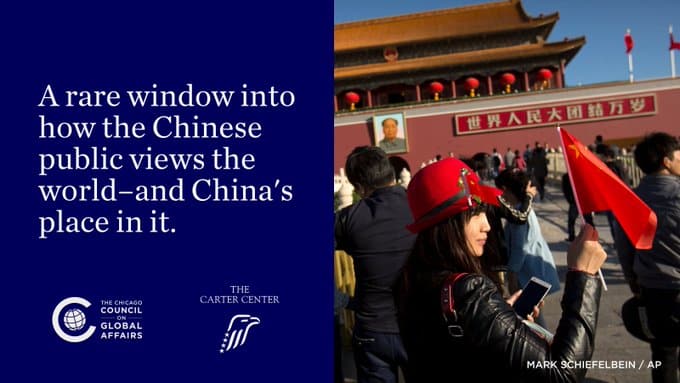Carter Center China Advisor Yawei Liu Speaks on Oxford Political Review Panel
By Kathryn Putz
On March 8th, 2021, the Oxford Political Review (OPR) hosted a virtual panel titled, “Civil Society and U.S.-China Relations.” The panel, which was moderated by OPR Chairman Michael Shao, featured four experts from across the government, academic, nonprofit and media spheres. Mr. Shao framed the event by defining civil society, citing it both as “a wide array of organizations, community groups, non-governmental organizations…and charity groups,” and more colloquially as “the third sector after government and business.”
To open the discussion, Mr. Shao asked the four panelists to hypothesize how President Biden’s approach to China will differ from former President Trump’s.
First, Dr. Yawei Liu, Senior Advisor on China at The Carter Center, commented on the diverging opinions on bilateral competition between the U.S. and China. From the U.S. perspective, Dr. Liu explained that competition is like “athletes in the Olympic games…you want to run faster, jump higher, but you are not going to trip other people.” However, from the Chinese perspective, the U.S. seeks to crush China to the point where they will no longer be able to compete.
Next, Professor Susan Thornton, Former Acting Assistant Secretary for East Asian and Pacific Affairs at the U.S. State Department, elaborated on the seemingly more nuanced opinion on bilateral competition held by President Biden. Extreme competition, Professor Thornton explained, arose from American scholars working under a mission to change China–a mission that has clearly failed. Biden, she believes, will take a more multifaceted approach, “collaborating with China on some areas, competing in other areas,” and recognizing that there are “some areas with fundamental disagreements.” NPR’s Beijing Correspondent Emily Feng echoed Professor Thornton’s perspective in her remarks, arguing that the course of the bilateral relationship will depend on how well the Biden administration can compartmentalize between collaborative and competitive issues.
Finally, Kerry Brown, Professor of Chinese Studies and Director of the Lau China Institute at King’s College, contributed three factors he believes will guide the future of U.S.-China relations. First, structure: the U.S. must better understand how China, as a communist system, became so effective as a capitalist actor. Second, size: the U.S. should solve the monumental problems within the bilateral relationship through transnational collaboration. Third, ambiguity: the U.S. must accept that US.-China relations are heading towards a state of “messy ambiguity.”
Turning to the topic of civil society, Mr. Shao asked the panelists about the impact of plummeting public opinion of China on civil society. Across all speakers, the sentiment remained the same: civil society currently faces an almost inhospitable working environment.
From the perspective of non-governmental organizations, Dr. Liu revealed that promoting the mission of mutual understanding and bilateral cooperation has become increasingly difficult, as there is currently “no way to say anything positive in the U.S. about China.” Low public opinion exists, Dr. Liu commented, largely as a result of Americans’ misperception that China will “steal our lunch.”
Similarly, from the media side, Ms. Feng identified a general lack of trust as the biggest problem facing civil society. On the micro level, people-to-people relationships–specifically between American and Chinese journalists–are near nonexistent, as ascertaining the identity and purpose of journalists has become impossible. On the macro level, big issues in the bilateral relationship stem, in Ms. Feng’s opinion, from a lack of credibility of the Chinese government and a tendency to “not take China at its word.”
According to Professor Brown, tensions have also risen within the academic realm, with universities situated “in the firing line” of U.S.-China relations. Professor Brown articulated that universities are now seen as elite entities with the capacity to “brainwash the young.” At the forefront of the criticisms are China research centers, which have become increasingly politicized–researchers in the field of China studies are forced to take either a pro or anti-China stance.
Concluding on a more hopeful note, the panelists were asked to identify strategies for improving the role of civil society in U.S.-China relations.
Speaking as a foreign correspondent, Ms. Feng offered three concrete policy changes she believes would rebuild trust between Chinese and American journalists. First, she urged the Chinese government to allow American journalists back into China and reopen access to information. Second, she suggested lengthening visa stays and ceasing the use of visas as a retaliation strategy. Third, she recommended that foreign journalists be allowed to hire assistants independently, and not through the Chinese Communist Party-controlled foreign ministry.
Professor Thornton and Dr. Liu drew consensus across many of their more general recommendations. Most notably, Professor Thornton urged the U.S. public to end the “inexplicable aura of emotion” surrounding U.S.-China relations. Similarly, Dr. Liu recommended that NGOs once again play a more active role in US.-China relations–which would require an increased level of open-mindedness and confidence from the public and U.S. policymakers.
The role of civil society in fostering strong U.S.-China relations is crucial; yet, the current political and public opinion climate is undermining, rather than bolstering, the legitimacy of such institutions. While all panelists embodied a more pessimistic tone, they offered a glimmer of hope for Biden’s new China strategy. Now, the question remains whether President Biden will take a more nuanced approach to competition and cooperation with China–and whether civil society can once again play a prominent role.
Click here to watch the full event.








